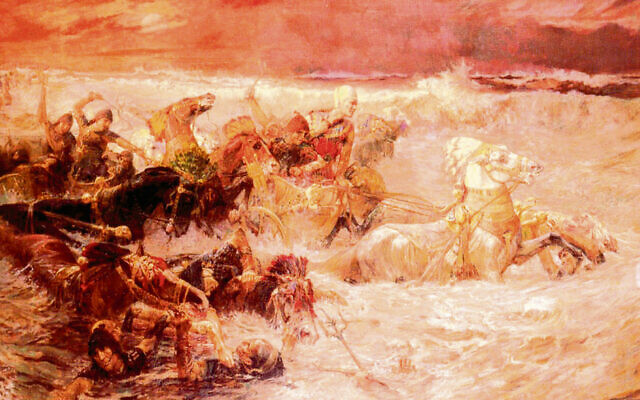A lesson in trust, just jump in
In Torah even a single letter has depth of meaning.

WHEN I was a student, I travelled from Melbourne to Auckland to assist the Auckland Hebrew Congregation with a Pesach seder.
Several supplies not available in New Zealand at the time were requested from Melbourne by the shule administration. My fellow students and I arrived at Melbourne International Airport with boxes and boxes of supplies. At the check-in counter line, we were worried about the excessive overweight luggage we were carrying. How much would this cost? While waiting for our turn and uncertain as to what would transpire, my friend declared, “Don’t worry, have faith, all will be good.”
He then asked us to imagine what it must have been like for the Jewish people standing at the sea with an Egyptian army pursuing them. A leap of faith would have been required. Sure enough, the agent inquired about our cargo as we approached the desk. We told them it was for a religious festival and to support the Jewish community in New Zealand. When they returned from speaking with the manager, they lifted the barrier rope and let us come through, telling us the manager was honoured to help us out and free luggage was allowed! My friend’s wise words linking this event to the Jewish people at the kri’at Yam Suf (splitting of the sea) still ring true today.
Speaking of wise words, the Torah is a very unique book in that every sentence, word, letter and nuance, when analysed carefully, teaches us an infinite amount of wisdom and life lessons.
In relation to the Israelites crossing the sea, there are two verses which may appear almost identical at first sight, but if carefully examined, one finds a slight difference that teaches us something quite valuable.
The first verse states:
“The Israelites went into the midst of the sea on dry land, and the water formed a ‘chomah’ (wall) for each tribe on its right and on its left” (Shemot 14:22).
Looking at the second verse, the Torah tells us:
“And the Israelites had walked on dry land in the midst of the sea, and the water formed a ‘chomah’ for them, on their right and on their left” (Shemot 14:29).
In the first verse it mentions “midst of the sea” first and then “dry land” and the word in Hebrew for wall is spelled “chet’ vav’ mem’ heh” including the letter “vav”.
In the second verse it mentions “dry land” first and then “midst of the sea” and the Hebrew word for wall is spelled without a “vav”.
The Torah describes two attitudes, two approaches, and two fundamentally different ways to deal with challenges in life.
Someone who lacks trust in Hashem is described in the second verse. They must wait until the land is completely dry before they can tackle any challenge or difficulty. For someone like that the waters of challenge cause them to be filled with “ch’m’h”, without a “vav”, which actually means anger, fury or rage. Rather than being able to handle challenges, they feel uneasiness and fear because they lack trust.
However, the earlier verse describes someone who trusts in Hashem. It is as if they see a challenge or difficulty and says I am confident the One above will help me through it. Rather than wait for dry land, they jump in while it is still wet. The challenge does not make them angry but instead they become like a “chomah – ch’v’m’he” spelt with a “vav”, strong and confident like a wall, ready to face up to anything that life brings.
You will be able to face life’s challenges upright, strong and confident if you have the faith that Hashem above will guide you through them. While I am not suggesting that anyone take a large quantity of items to the check-in counter and beg for free passage, when we do face a challenge, remember to place the “vav” in your life, connect with the one Above, and the seas ahead will part no doubt!
Daniel Rabin is rabbi of Caulfield Hebrew Congregation and a former president of the Rabbinical Council of Victoria.

comments